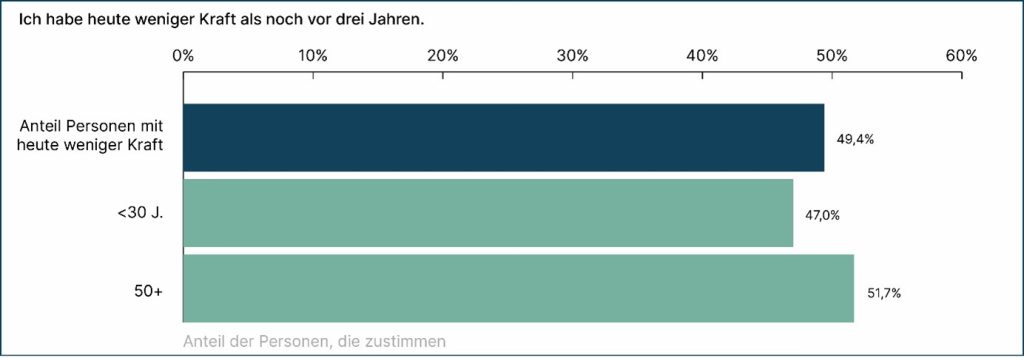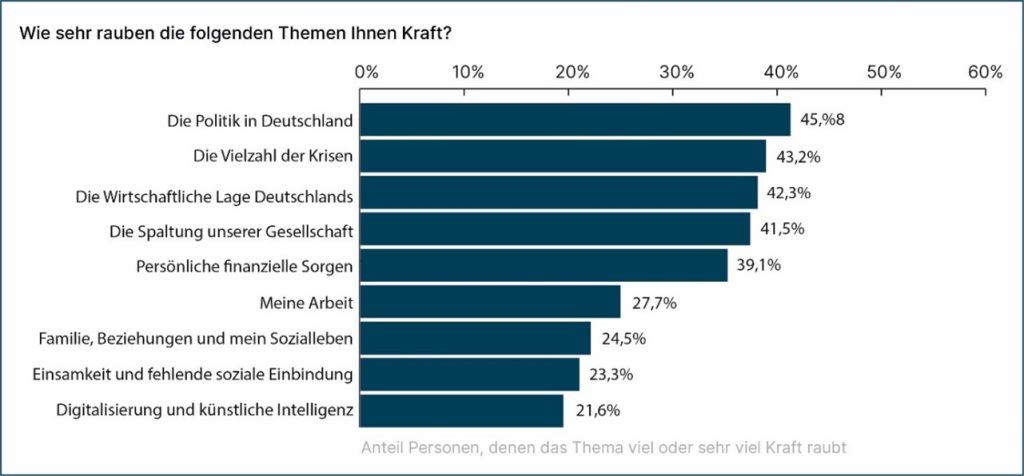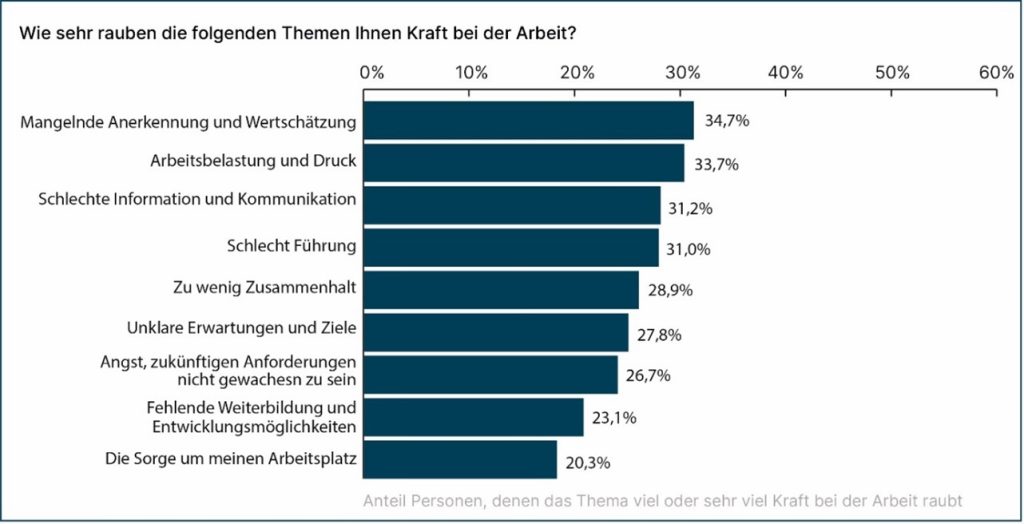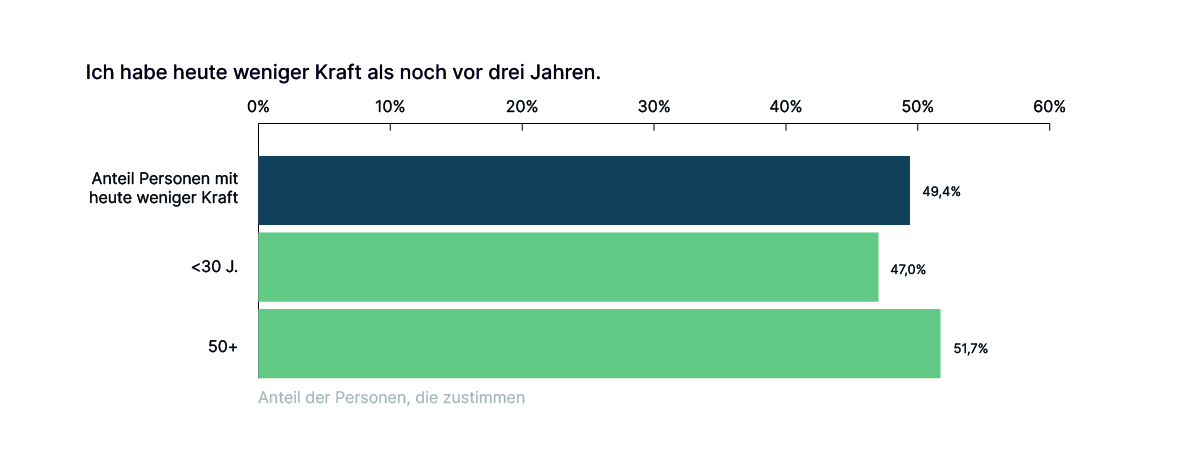Die Kräfte der Menschen nehmen deutlich ab – Jeder Dritte hat zu wenig Kraft für seine Arbeit

Eine aktuelle repräsentative Umfrage des PINKTUM Institute unter der erwerbstätigen Bevölkerung in Deutschland belegt eine zunehmende Erschöpfung der Deutschen.
- Jeder Zweite (49,4 %) gibt an, in den vergangenen drei Jahren deutlich an Kraft eingebüßt zu haben.
- Jeder Dritte hat zu wenig Kraft für seine tägliche Arbeit.
- Die größten Krafträuber sind die Vielzahl der Krisen (43%) und die Unzufriedenheit mit der Lösungskompetenz der Politik (46%).
- Der größte Krafträuber bei der Arbeit ist mangelnde Wertschätzung und Anerkennung.
Joachim Pawlik, einer der führenden europäischen Personalentwickler, dessen Beratungsgruppe jährlich rund 40.000 Menschen coacht und trainiert, nahm in Kunden-Gesprächen immer stärker wahr, dass die Menschen ausgelaugt sind. Ende 2023 beauftragte er das unternehmenseigene PINKTUM Institute mit einer repräsentativen Umfrage über den Krafthaushalt der erwerbstätigen Bevölkerung. Die Teilnehmerinnen und Teilnehmer gaben an, was ihnen Kraft raubt, woraus sie Kraft schöpfen und was ihr Arbeitgeber tun könnte, damit sie ihre Aufgaben leichter stemmen.
Die Ergebnisse sind alarmierend:Rund die Hälfte der Befragten (49,4 %) hat in den vergangenen drei Jahren deutlich an Kraft verloren. Der Blick auf die Top 5 Krafträuber zeigt, dass viele Menschen unter mehreren Belastungen gleichzeitig leiden.
Umfrageleiter Dr. Wolf-Bertram von Bismarck stellt fest: „Wirtschaftliche, gesellschaftliche und politische Sorgen und Ängste belasten die Menschen in ähnlichem Ausmaß, aber offenbar zermürbt es sie besonders, dass die Politik keine adäquaten Antworten auf die Probleme hat.“

Führungskräfte sind positiver und kraftvoller
Nur etwas mehr als die Hälfte (55%) der Befragten blickt positiv in die Zukunft. Interessant ist, dass deutlich mehr Führungskräfte (69,2 %) positiv eingestellt sind als Mitarbeitende ohne Führungsposition (45,8%). Außerdem gibt ein deutlich höherer Anteil der Führungskräfte an, ausreichend Kraft für die Arbeit zu haben (77%). Ohne Führungsposition meinen das nur 62 Prozent. Besorgniserregend ist, dass im Durschnitt jeder Dritte sagt, keine ausreichende Kraft mehr für seine Arbeit zu haben.
Mangelnde Wertschätzung ist der größte Krafträuber bei der Arbeit
Mehr als jeder dritte Befragte gibt an, dass ihm mangelnde Anerkennung und Wertschätzung am meisten Kraft bei der Arbeit raubt. 31 Prozent empfinden schlechte Führung als Krafträuber. Untersuchungsleiter von Bismarck: „Dass die Menschen so wenig Anerkennung spüren, ist ein erschreckende Ergebnis, aber leider gerade in angespannten Zeiten häufiger zu beobachten. Die gute Nachricht ist, dass Führungskräfte hier schnell und gezielt gegensteuern können.

Flexibilität, sinnvolle Tätigkeiten und Weiterbildungs- und Entwicklungsmöglichkeiten wichtiger als mehr Geld
Gefragt, was Arbeitgeber tun sollten, damit Arbeitnehmer sich mit mehr Energie in ihre Arbeit einbringen, votieren die meisten für: „flexible Arbeitszeiten“ (46%), „sinnvolle Tätigkeiten“ (44%) und „mehr Weiterbildung und Entwicklungsmöglichkeiten“ (44%). Je 40 Prozent wünschen sich ein „besseres Miteinander“ und „mehr Eigenverantwortung“. „Spannend ist, dass der Wunsch der Mitarbeitenden nach besserer Vergütung auf dem letzten Platz landet. Jeder Dritte (36%) wünscht sich zwar mehr Geld, aber ein viel größerer Hebel für mehr Engagement und Kraft liegt darin, wie sich die Menschen in der Arbeit entfalten können“, so von Bismarck.
Jüngere sind grundsätzlich optimistischer, aber Arbeit und Einsamkeit raubt ihnen mehr Kraft
Die Studie offenbart teilweise signifikante Unterschiede zwischen den Altersgruppen.
- Befragte im Alter von 20 – 30 Jahren blicken zu 69% optimistisch in die Zukunft. (Nur 42 % der Überfünfzigjährigen sind noch zuversichtlich.)
- Allerdings ist die Arbeit für Jüngere kraftraubender als für die ältere Generation. Etwa jeder Dritte bis 30 Jahre (32%) gibt an, dass ihn die Arbeit übermäßig viel Kraft kostet. Bei den Überfünfzigjährigen trifft dies nur auf jeden Vierten zu (24%).
- Bei Jüngeren schlägt sich mangelnde Anerkennung besonders stark im Krafthaushalt nieder (42%).
- Ein drastischer Unterschied zeigt sich beim Thema Einsamkeit. 28 Prozent der 20 bis 30-Jährigen leiden unter fehlender sozialer Einbindung. Ab 50 Jahren trifft dies nur auf 16 Prozent zu.
Joachim Pawlik sieht Lösungsansätze in einer neuen Idee von Führung, die mehr Anerkennung für die Herausforderungen und Leistung des Einzelnen beinhaltet. „Verstehen, wie es den Menschen im Team geht, sich Zeit nehmen für Gespräche und sie ermutigen“, sagt Pawlik, gehöre dazu.
Das PINKTUM Institute ist ein Tochterunternehmen von PINKTUM und gehört zur PAWLIK Group. Die Befragung wurde im 4. Quartal 2023 unter 1019 Personen durchgeführt. Die Datenerhebung erfolgte über die Talk Online GmbH.
Die vollständige Umfrage senden wir Ihnen auf Anfrage an unsere Pressestelle gerne zu (kristina.behrend@pinktum.com).
Über PINKTUM
PINKTUM ist das in Europa führende EdTech-Unternehmen für die nachhaltige Verbesserung von Soft Skills in Organisationen. Kunden durchlaufen digitale Lernpfade, die mit Hilfe von KI individualisiert und auf den spezifischen Entwicklungsbedarf ausgerichtet werden und das Lernen in den Arbeitsalltag integrieren. Die international preisgekrönte Online-Bibliothek umfasst rund 600 videobasierte, interaktive E-Trainings, die in mehreren Sprachen kulturell angepasst zur Verfügung stehen. Auf Basis neuster technischer Möglichkeiten und psychologischer Forschung entwickelt PINKTUM seine Methoden und Lerninhalte permanent weiter.
PINKTUM ist der Markenname der 2010 gegründeten Pink University GmbH, die mit rund 150 Mitarbeitenden an 16 Standorten weltweit vertreten ist und ihren Hauptsitz in Hamburg und München hat. CEO ist Joachim Pawlik. Das Unternehmen gehört zur PAWLIK Group.


